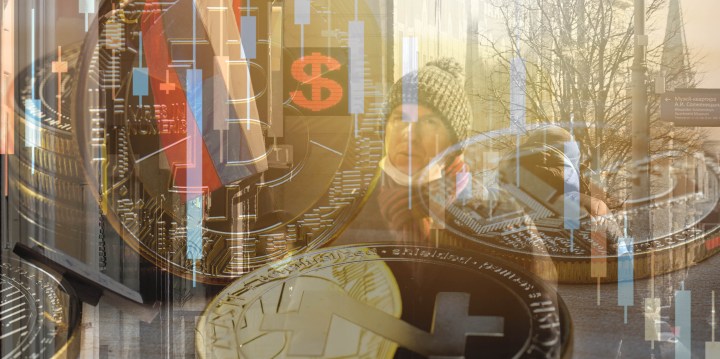CRYPTOCURRENCY
Crypto companies defy the Russian disinvestment trend

The war between Russia and Ukraine is putting cryptocurrencies to the test. Will they prove to be a store of value – or a tool to evade sanctions and hide the proceeds of crime?
In the days just after Russia invaded Ukraine the value of digital currencies spiked. The rise was led by bitcoin, followed by currencies such as ethereum and solana. It was driven by a surge in demand from anxious Russians and Ukrainians, who pushed the price of bitcoin to $44,404 from $37,717, as citizens desperately moved their savings into an asset that was more liquid and more stable than theirs, in particular the Russian rouble, which fell from 13c to the USD to 0.00085c in a matter of days.
For bitcoin, the dramatic jump might have wiped out February’s losses, but the currency remains well off its highs of $67,582 reached last November. Meanwhile, the price of gold, still the world’s favourite store of value, has risen almost 8% since the invasion began, touching $2,020 before falling back slightly to $1,992.
Equity markets, anticipating slower global growth owing to higher oil and food prices and supply-chain distortions, not to mention cybersecurity risks and other negative effects of the war, are naturally jumpy and will remain so for the foreseeable future. The Russian stock exchange is still closed and the Russian government has imposed a range of restrictions on its population, including forex controls.
However, trading in cryptocurrencies using Russian roubles in particular is still active and has sparked fears that Russian oligarchs are using cryptocurrencies to get their ill-gotten gains out of Russia. Even worse, many fear that the Kremlin may also use the decentralised system to evade sanctions and fund its increasingly costly war.
Punitive financial and economic sanctions imposed on Russian banks and businesses by the US and Europe have all but shut down the traditional banking system, rendering two-thirds of the $630-billion war chest that Russia holds in reserves useless. The other third is held in Chinese yuan and gold. All eyes are now on the world’s financial systems to ensure that money is not moved in contravention of sanctions.
The fact that the world’s crypto exchanges have refused to pull out of Russia fully is adding to fears that cryptocurrencies could be the route. After all, the nature of crypto is that it flies below the radar of governments and financial institutions, is semi-anonymous, transcends borders and exists in cyberspace.
Last week, the world’s largest cryptocurrency exchange, Binance, agreed to target Russian clients who have been sanctioned by the West, but will not freeze the accounts of everyday Russians, despite a specific request from Ukraine’s 31-year-old Vice-Prime Minister Mykhailo Fedorov.
“We don’t think it is right for businesses or platforms to unilaterally decide to freeze populations of users’ assets,” CEO Changpeng Zhao wrote in a blog in response to Western outrage at the decision. “There are normal Russian citizens in London, New York. Should a bank CEO in London have the power to unilaterally decide to freeze those people’s assets? On what grounds?”
Similarly, the crypto exchange Coinbase said that it would comply with sanctions, but would “not institute a blanket ban on all Coinbase transactions involving Russian addresses”.
Jesse Powell, founder and CEO of crypto exchange Kraken, added his voice to the debate: “Sometimes the hardest thing about having power is knowing when not to use it. Our mission is better served by focusing on individual needs above those of any government or political faction. The People’s Money is an exit strategy for humans, a weapon for peace, not for war,” he tweeted.
This has become a big talking point, but is it really a big deal? Is crypto really the sanctions-busting tool that some are saying it is?
“The Kremlin, Putin and his inner circle have a long and extensive playbook for the laundering of money. Front and centre of this is their web of international company registrations,” said Todd Conklin, counsellor to the deputy US Treasury secretary, in a webinar hosted by TRM Labs, which monitors crypto transactions, fraud and financial crime.
“They are adept at creating complex layers of companies, and they are adept at converting roubles into other assets, including gold and foreign currencies. Is crypto part of this playbook? Certainly it would be, but it will not be top of the list.”
Ari Redbord, head of legal and government affairs at TRM Labs, added during the same webinar: “We have seen an escalating wave of sanctions and an attempt to cut off Russia from the global financial system. And yes, crypto provides an alternative to traditional financial systems. So yes, it makes sense for Russia to try to circumvent the US financial system by turning to crypto.”
But the experts agree that, for many reasons, this will not happen.
First, blockchain, the technology that underpins bitcoin, is a public ledger of activity.
It is therefore possible to track the movements of funds from one account to another quite easily. This does not make it a good tool for sneaking money through the system.
“The biggest misconception about crypto remains that it is untraceable and is primarily used for nefarious purposes, which couldn’t be further from the truth,” said Marius Reitz, Africa GM of Luno, a crypto exchange.
“Most cryptocurrency platforms and exchanges such as Luno adhere to strict financial crime regulations, including requirements to comply with global sanctions laws and to implement tools and processes to ensure customers are identified and their transactions are monitored for suspicious or illegal activity. This means that, with increasing sanctions, the movement of funds through cryptocurrency is not easy,” he said.
Meanwhile, there isn’t enough liquidity in the crypto ecosystem for Russian oligarchs and companies to move their money around.
Carole House, the director of cybersecurity at the US’s National Security Council, said during the same webinar that the scale that Russia would need to circumvent all financial sanctions “would almost certainly render cryptocurrency as an ineffective primary tool for the state”. However, “we do remain vigilant against this threat and against the use of this vehicle as a means for evading sanctions”.
So if crypto is not the tool to enable sanctions-busting, what role has it played in the war? Aside from some ordinary Russians and Ukrainians using it as an avenue to preserve their savings in the face of currency collapse, Ukrainian causes (including the Ukrainian government itself) have raised more than $55-million through crypto.
Bloomberg reported recently that “Ukraine has already spent $15-million of the donations it received in cryptocurrencies on military supplies, including vests… About 40% of the suppliers are willing to take crypto.”
Whether cryptocurrencies can best be described as assets, a store of value or a means of exchange is probably academic. What this war shows is that the crypto ecosystem is now a small but firmly established part of the global financial system. And when the dust settles, it will grow further. DM168
This story first appeared in our weekly Daily Maverick 168 newspaper which is available for R25 at Pick n Pay, Exclusive Books and airport bookstores. For your nearest stockist, please click here.



















 Become an Insider
Become an Insider
Comments - Please login in order to comment.